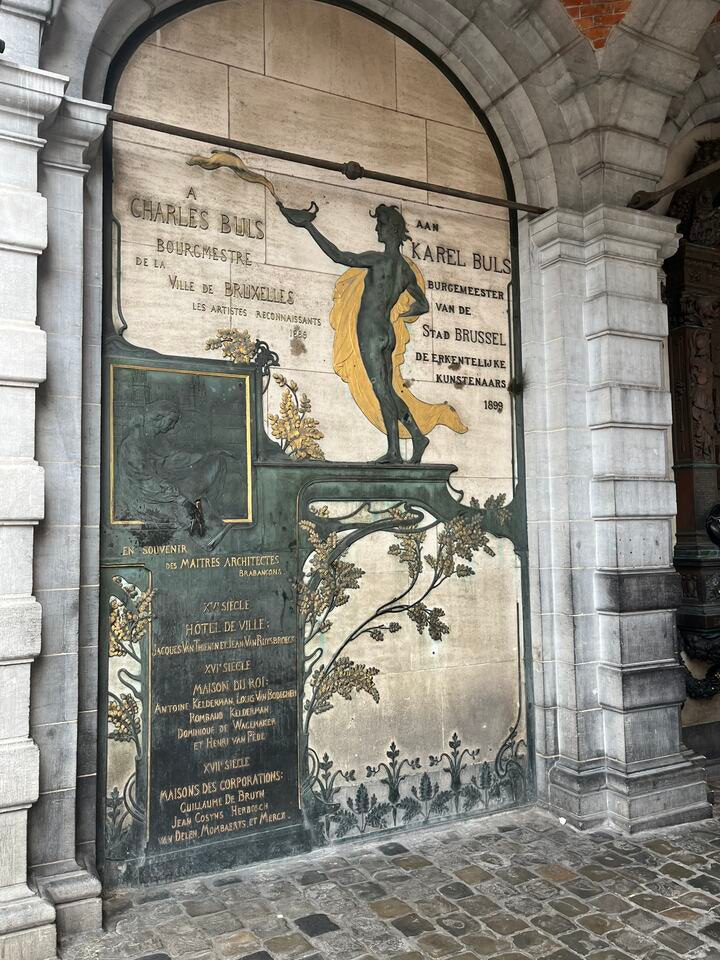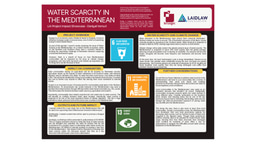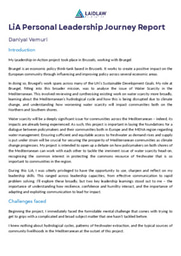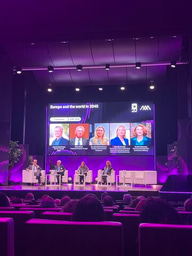Brussels LiA Week 1 - Hold your Nerve!

This week I began my Leadership in Action project at Bruegel in Brussels. Over the course of six weeks, I am working on a project about Climate Adaptation in the Mediterranean. In October, the European Union will present a New Pact for the Mediterranean, a new initiative that is aiming to foster a collaborative and inclusive partnership between the EU and the countries of the Mediterranean. As part of this wider dialogue, I am working on a project at Bruegel to create a case for the EU to help the communities of the southern Mediterranean (e.g. the North African states) adapt to the ongoing effects of climate change. This will involve looking at how climate change will affect those local communities (e.g. how reliant are they currently on water-intensive industries), how climate adaptation may mitigate those effects whilst also creating opportunities for those communities, and finally how the EU might be moved to help those communities in their climate adaption efforts.
The LiA has been an intense experience so far, and has really pushed me to develop my courage. I had been aware that it was going to be difficult moving to a new country on my own for the first time and tackling a new project which frankly does not lie within my area of expertise. I did not, however, anticipate just how challenging this would be.
On Monday, I arrived at Bruegel and settled in with the team. I was welcomed by everyone there, but nevertheless this was a formidable and mentally difficult moment. I had just completed an internship during the summer in London, and that had been such a positive experience for me. By that, I mean that I really found a sense of community in the organisation that I was in and the interns around me, I really found the work interesting, and I also felt really competent in that environment – I was challenged but to just the right level where I still felt like I was on the edge of my comfort zone. The first day at Bruegel, therefore, was a gear change. It was intimidating being surrounded by people at least five years older than me, all of whom at least have Masters degrees in their field and research experience, and most of whom have a PhD and are renowned experts in their field. I went from a place where I felt deeply in place to a place where I felt deeply out of place.
This experience, this stress of being far from home and out of my depth, taught me the importance of personal courage. In particular, it taught me the importance of having courage in terms of mental fortitude, the importance of holding your nerve when the situation looks difficult. Until about Wednesday this week, I truly was intensely stressed out at all times whilst I was at Bruegel – I felt like an impostor to some extent, and I felt like I wasn’t going to live up to the expectations of people around me. But when you know that your return flight is in six weeks’ time, you have to hold your nerve. Beyond that, I discovered that courage for me involves having the strength to choose to reframe a situation that you are treating as negative in your mind into a situation that is positive. By Wednesday, I started viewing this situation as an exciting opportunity. Yes, I am deeply out of my depth, I’m far from home, and I’m tired from not really having a break this summer at all. Those are all true. But this is such an exciting opportunity to build my skills and learn from incredible people, to experience a new country at the heart of the European community, and to continue to weave a summer of growth that will truly have changed me by its conclusion.
I was introduced to this project by a member of the team at Bruegel who had been working on this for three months and who was leaving now. I felt challenged by the fact that I was being asked to get up to speed and contribute meaningfully on a project within six weeks after three months of dedicated work by someone who has studied in the environmental field, but I realised that this was an opportunity to exercise that skill of reframing. Instead of negatively feeling that I was incapable for this task and that I did not have the subject matter expertise, I chose to acknowledge that I do not have the knowledge yet but that I will take the time to get up to speed, and I made it clear to myself that I have value to add. I have a fresh perspective, and I have the courage to put this forward.
For example, the project so far has looked at the economic impact that climate change will have on the communities of the Mediterranean, and has identified a need for climate adaptation collaboration between the EU and the southern Mediterranean in order to shield those communities. To me, however, from my personal skillset as an economics student and previous experience in working with stakeholders to deliver impact, I was able to identify that this project as it stood fundamentally lacked a good argument to persuade EU policymakers to actually set aside time, effort and resources to collaborate with the southern Mediterranean states on climate adaptation. This is important as ultimately that persuasion is what will matter for ensuring that the impact reaches those communities and that progress is made on the relevant SDGs.
To that end, after reviewing the work that had already been done, I identified two key areas where I could take this project forward in order to make that persuasive argument that ensures that impact is actually delivered. Firstly, I could go down the path of researching the current climate finance approach of the EU and how this could and should be adapted to facilitate climate adaption collaboration for the benefit of southern Mediterranean communities. Secondly, I could go down the path of researching the security risks of climate change for the communities of the southern Mediterranean. My thought was that this research is more compelling as a basis for making an argument to EU policymakers that they should focus more on aiding climate adaptation in the Mediterranean.
I did not, however, make a decision on this this week. Additionally, I still do not feel as though I have a good enough understanding of the work already done in order to take it forward in a meaningful manner, and importantly in order to make the decision on which of the two paths above to focus on in order to create impact.
This week, I’m intending to focus on collaboration. I’m going to reach out to some internal members of Bruegel to get their guidance on what they expect from the project, which of the two paths above they think could be more promising, and what output they would like from me regarding the chosen path. I’m also going to use that engagement to ask about external stakeholders that it would be useful for me to speak to in order to deepen my understanding of the area. Whilst I wait for these people to get back to me, I’m going to continue to review the work already done and to scope out the two pathways which I’ve identified to see which one is more promising.
Overall, I started this week feeling daunted by the LiA. I am ending it with still some healthy apprehension – I want to deliver a meaningful contribution to this long-term project but it is a behemoth task to tackle in six weeks – but mainly excitement. This truly is an exciting opportunity to grow my leadership skills and to hone my character, and I’m glad to be here!





Please sign in
If you are a registered user on Laidlaw Scholars Network, please sign in
Daniyal, well done on finding the courage to reframe, adapt and engage! It sounds like week 1 was a daunting but exciting introduction to the world of research. As the weeks come, I hope that the more advanced interns will be able to collaborate with you and build a new sense of belonging as you engage different stakeholders and uncover potential solutions wicked and complex climate challenges. Good luck!
Sounds awesome, good luck!